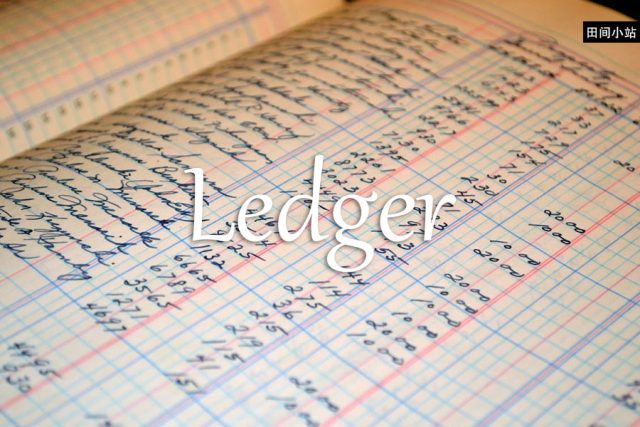本文经授权转载自微信公众号:田间小站

TEM8 GRE BEC TOEIC
外刊例句
- In essence it is a shared, trusted, public ledger that everyone can inspect, but which no single user controls.
本质上它是一个共享的、可信的公共账目,每个人都可以查看它,但它不受单个用户的控制。
——《经济学人》 - She has been collecting and analyzing leaks from the Bitcoin blockchain, the immutable public ledger that has recorded all transactions since the cryptocurrency’s launch in January 2009.
她一直在收集和分析比特币区块链的漏洞,比特币区块链是一个不可变的公共账目,记录了自2009年1月该加密货币推出以来的所有交易。
——《纽约时报》
基本释义
[noun] a book or other collection of financial accounts of a particular type
[名词] 一种特定类型的财务账目的账簿或其他集合
深入解读
作为一个财会术语, ledger 不仅是一个时不时就会在《经济学人》中看到的单词,同时从上面的外刊例句也不难发现这是一个与区块链(blockchain)技术息息相关的单词。
该词很可能源自中古英语动词 leyen, leggen (放置),在中古英语中拼作 lygger, leger ,表示“永久存放在某一特定地点的书本,尤指教堂中天主教、东正教神职人员每日念诵的日课经或者说祈祷书的大副本”以及“横梁”。
从这个概念出发, ledger 先是在16世纪40年代用作形容词表示“固定在一处的、不动的”,虽然这个含义现已不再流行,但仍然可以从 ledger bait (沉于水底的“固定底饵”)、 ledger tackle (固定底饵钓具)这些钓鱼术语中看出端倪。
然后到了1588年后,开始发展出现在的主要含义指“分类账簿、分户账簿、收支总账”,主要指银行、企业、组织等用来登记各类经济业务增减变动以及其余额的账簿,一般会根据会计科目的名称进行设置。
其中,根据一级会计科目设置的账簿叫总分类账(general ledger),它提供各类经济业务的总括情况;根据二级或明细科目设置的账簿叫明细分类账(subsidiary ledger),它提供各类经济业务的详细情况。比如:
此外, ledger 现在还可以用在建筑领域表示脚手架上用于垂直支撑的“横木”,也可以指覆盖坟墓的扁平“盖墓石板”。
好书用例
When you come to one of the many moments in life where you must give an account of yourself, provide a ledger of what you have been, and done, and meant to the world, do not, I pray, discount that you filled a dying man’s days with a sated joy, a joy unknown to me in all my prior years, a joy that does not hunger for more and more but rests, satisfied. In this time, right now, that is an enormous thing.
在往后的生命中,你会有很多时刻,要去回顾自己的过去,罗列出你去过的地方,做过的事,对这个世界的意义。我衷心希冀,遇到这样的时刻,你一定不要忘了,你曾经让一个将死之人的余生充满了欢乐。在你到来之前的岁月,我对这种欢乐一无所知。我不奢求这样的欢乐永无止境,只觉得平和喜乐,心满意足。此时此刻的当下,这是我生命中最重大的事。
出自美国神经外科医生保罗·卡拉尼什(Paul Kalanithi)于2016年出版的生命笔记《当呼吸化为空气》(When Breath Becomes Air)。
同近义词
- book: a set of records or accounts
- log: an official record of events during the voyage of a ship or aircraft
- register: an official list or record, for example of births, marriages, and deaths, of shipping, or of historic places
